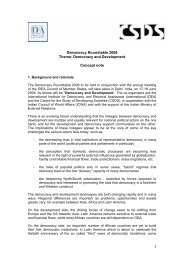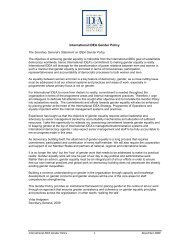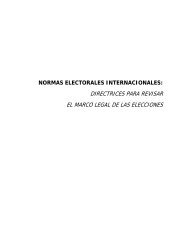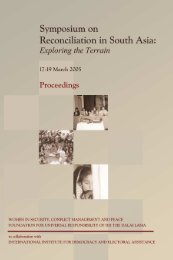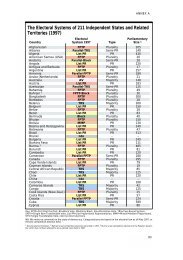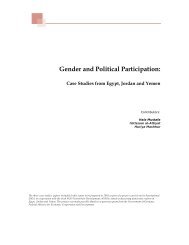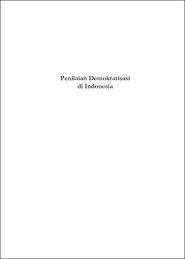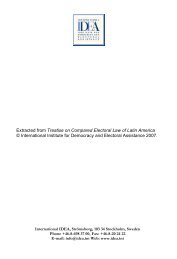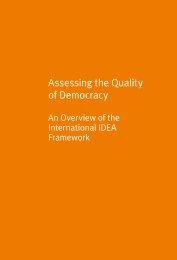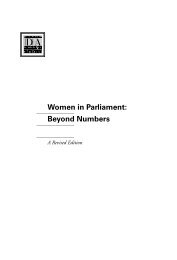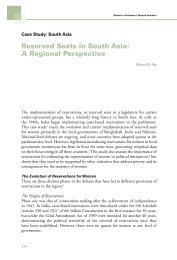The Role of State Constitutions in Protecting ... - International IDEA
The Role of State Constitutions in Protecting ... - International IDEA
The Role of State Constitutions in Protecting ... - International IDEA
Create successful ePaper yourself
Turn your PDF publications into a flip-book with our unique Google optimized e-Paper software.
◆<br />
A few social powers, although these are the exception rather than the<br />
rule; <strong>in</strong> particular, marriage and divorce and the power <strong>in</strong> section 51(23A)<br />
to make certa<strong>in</strong> welfare payments.<br />
Grouped <strong>in</strong> that way, it is possible to understand the logic underly<strong>in</strong>g the<br />
allocation <strong>of</strong> most <strong>of</strong> these powers to the Commonwealth. As a generalization, the<br />
Commonwealth was given powers that could not be handled adequately with<strong>in</strong><br />
<strong>State</strong> borders, particularly if, as was the case <strong>in</strong> Australia, federation was <strong>in</strong>tended<br />
to establish a national common market. As orig<strong>in</strong>ally conceived, the Australian<br />
federal model left to the <strong>State</strong>s all or most <strong>of</strong> the powers necessary to run their<br />
own communities. Important powers left to the <strong>State</strong>s <strong>in</strong>cluded, for example:<br />
◆<br />
◆<br />
◆<br />
◆<br />
◆<br />
Health, education, hous<strong>in</strong>g and <strong>in</strong>trastate transport<br />
Land, agriculture and natural resources. Section 51(31) <strong>of</strong> the<br />
Constitution also ensures that the Commonwealth cannot acquire<br />
property, from the <strong>State</strong>s or anyone else, without provid<strong>in</strong>g “just terms”.<br />
Local government.<br />
Civil liberties and human rights<br />
Environment<br />
In practice, however, it has proved almost impossible for Commonwealth and<br />
<strong>State</strong> powers to be exercised <strong>in</strong> isolation from each other. <strong>The</strong> area <strong>of</strong> health<br />
provides an obvious example. <strong>The</strong> <strong>State</strong>s have power <strong>in</strong> relation to hospitals and<br />
health services. <strong>The</strong> Commonwealth has power <strong>in</strong> relation to health <strong>in</strong>surance<br />
and medical benefits. Clearly it is not possible for these two sets <strong>of</strong> powers to be<br />
exercised completely <strong>in</strong>dependently. As a result, health and hospitals are now<br />
managed through a complex <strong>in</strong>tergovernmental scheme.<br />
Another complication for the federal division <strong>of</strong> powers is that matters that <strong>in</strong><br />
1901 were seen as purely a <strong>State</strong> concern gradually have developed a national<br />
dimension. Human rights and the environment are obvious examples. Another,<br />
less obvious example is education. Education traditionally is considered to be a<br />
sub national power <strong>in</strong> a federal system. On the other hand, there are aspects <strong>of</strong><br />
education that now have some relevance for areas <strong>of</strong> national power. A skilled and<br />
educated workforce, for example, has significance for national economic<br />
management.<br />
<strong>The</strong> Australian Constitution has proved difficult to change and there have been<br />
relatively few changes to the list <strong>of</strong> Commonwealth powers. As mentioned earlier,<br />
judicial <strong>in</strong>terpretation has enabled the Commonwealth to expand <strong>in</strong>to some areas<br />
<strong>of</strong> purely <strong>State</strong> concern. Thus the <strong>in</strong>terpretation <strong>of</strong> the external affairs power now<br />
enables the Commonwealth to make laws <strong>in</strong> relation to human rights and some<br />
aspects <strong>of</strong> the environment. Other areas <strong>in</strong> which the Commonwealth lacks power<br />
but <strong>in</strong> which a national response is needed are <strong>of</strong>ten handled through co-operation<br />
between the Commonwealth and the <strong>State</strong>s.<br />
37



